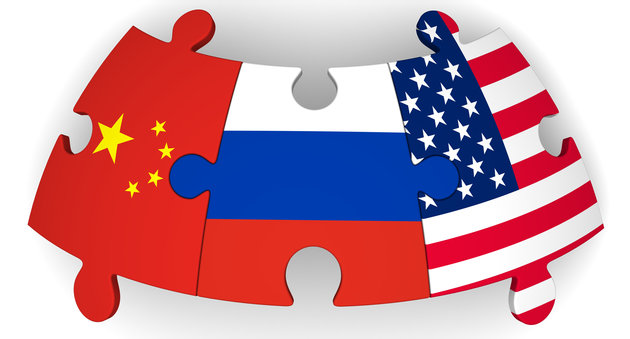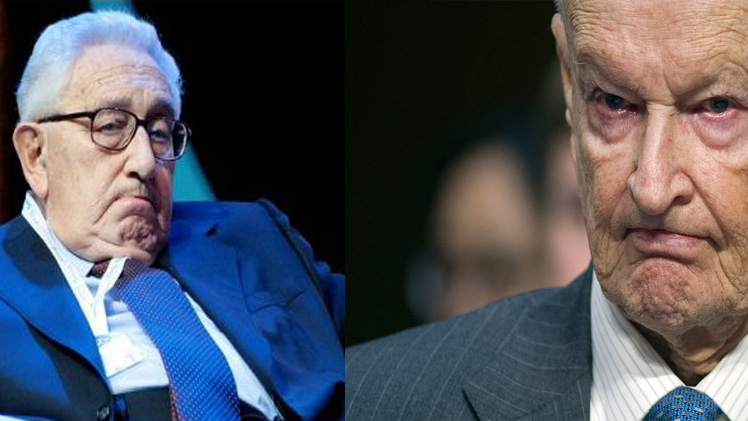por Alfredo Jalife Rahme
Hace 28 días, en el primer Foro Oslo del Premio Nobel de la Paz, Brzezinski adujo que la respuesta geopolítica ideal a la crisis global de poder es una conexión trilateral entre EU, China y Rusia (nótese el orden).
En el foro de marras participaron los dos máximos geoestrategas vivientes de EU, Henry Kissinger (93 años) y Brzezinski (88), con el tema “EU y la paz mundial después de la elección presidencial (https://goo.gl/LtgX3n)”.
The Huffington Post, que Wikileaks vincula al megaespeculador George Soros, publica la ponencia de Brzezinski sobre la “conexión trilateral de EU/China/Rusia (https://goo.gl/mhEus7)”.
Me llama la atención que utilice el término trilateral, en lugar de la tripolaridad ineludible de un G-3, quizá por su nostalgia a la Comisión Trilateral de 1973 entre Norteamérica/Europa Occidental/Japón, de la que fue cofundador con David Rockefeller.
He seguido la evolución, para no decir involución, del pensamiento geoestratégico de Brzezinski, en particular, desde su libro triunfal El gran tablero de ajedrez mundial: la supremacía estadunidense y sus imperativos geoestratégicos de entonaciones unipolares y fukuyamescas/simiescas de Fin de la historia en la Era tecnotrónic, hasta su más reciente libro Visión estratégica: EU y la crisis del poder global”, donde su legendaria rusofobia lo extravía al grado de alucinar y colocar a Turquía por encima de Rusia.
El pensamiento de Brzezinski se adapta a la decadencia doméstica y global de EU, que no oculta que el fallido golpe de la CIA en Turquía le trastocó sus coordenadas euroasiáticas con el objetivo de dislocar a Rusia, al unísono del cambio de régimen en el Kremlin, como propugnó Strobe Talbott, hoy director del propagandístico Brookings Institution.
Brzezinski confiesa que EU cometió un grave error al apadrinar el fallido golpe de Estado contra Turquía. Con Turquía e Irán deslizándose a la nueva alianza geoestratégica informal de Rusia y China, Brzezinski llega finalmente a asimilar la inevitable presencia de Rusia con China y EU en su esquema de conexión trilateral.
Brzezinski, adicto a un G-2 entre EU y China, siempre despreció a Rusia. Curiosamente fue China quien rechazó su tramposo G-2.
Su idealizado cuan elusivo G-2 se convirtió en una relación esotérica, lejos de la confrontación exotérica de Trump y China: aunque la relación sinoestadunidense no evolucionó a una alianza integral, la cooperación selectiva y algunas veces secreta se ha vuelto una de sus características definitorias.
Desde hace 18 meses, el influyente CFR había incitado a un G-2 de EU y Rusia contra China, a lo que parece confabularse Kissinger, que veo difícil compre el zar Vlady Putin, en la presente fase de cooperación de Moscú y Pekín.
Más que por placer, Brzezinski admite que en la era nuclear la precaución y colaboración debe prevalecer entre EU, China y Rusia, si se desea evitar un conflicto fundamental.
Admite a regañadientes que los tres principales actores del poder global son EU, China y Rusia y llama profundamente la atención que deje de lado, primordialmente, a la desfondada y desbrujulada Unión Europea, no se diga a India, Japón, Irán, Turquía y Brasil.
Luego de amarrar estériles navajas entre Rusia y China, Brzezinski sentencia que Rusia confronta una relación cada vez más compleja tanto con China como con EU que inevitablemente restringe sus ambiciones de largo plazo, cuando “sus aspiraciones solamente pueden ser realizadas si Rusia –desengañada de su idea de supremacía continental– evoluciona finalmente a ser un jugador líder en Europa misma”.
¿Regala Brzezinski parte de Europa para aplacar la resurrección militar del oso ruso?
El portal galo Red Voltaire cataloga a Rusia como la máxima potencia militar convencional del mundo, no se diga nuclear.
La rusofobia de Brzezinski lo obnubila y prefiero el abordaje más realista del cínico Henry Kissinger, quien aboga por la convergencia de intereses entre Trump y Putin.
Es más interesante el abordaje de Brzezinski sobre la relación de EU y China, con conspicua dedicatoria a Trump: EU no debe tratar a China como enemigo.
Considera que la política de EU con China se ha vuelto más ambigua y carente de visión estratégica compartida.
A mi juicio, Obama cometió el peor error geoestratégico de EU en los recientes 46 años, al haber empujado a China a los brazos de Rusia, visión compartida por Trump, quien busca disociar a las dos superpotencias nucleares euroasiáticas, de lo cual Brzezinski está consciente: EU debe ser cauteloso del enorme peligro de que China y Rusia puedan formar una alianza estratégica. Más aún: EU no debe favorecer a India como su principal aliado en Asia. Esto casi garantiza una conexión más estrecha entre China y Rusia. Nada es más peligroso para EU que tal estrecha conexión.
También falta que India acepte una bipolaridad suicida con EU cuando comparte una estrecha relación con Rusia y, pese a los diferendos añejos, se ha acercado a China mediante el triángulo RIC (Rusia, India, China), más que por el hoy alicaído BRICS, desde el punto de vista geoeconómico.
Brzezinski admite que el papel de EU se ha vuelto cada vez más defensivo en la políticamente despierta Eurasia.
Veo más bien a EU en retirada, cuando Japón se ha acercado a Rusia, mientras Sudcorea pasa por un momento doméstico turbulento, sin contar el contencioso nuclear de Norcorea, en el que tanto China como Rusia tendrán un impacto más positivo que los esfuerzos separados y abiertos de EU, a juicio de Brzezinski, en una solución tripolar.
Este fue uno de los graves errores de Baby Bush: alienar a Norcorea cuando ya tenía la mesa puesta, tanto por los ex presidentes Carter y Clinton, para arreglar su contencioso nuclear. Lo notable de la disquisición de Brzezinski es la incorporación de Rusia a su conexión trilateral.
Juzga que Rusia no tendrá más opción que aceptar la realidad y la necesidad de una mejor relación tanto con China como EU. Bueno, con China, en la fase del zar Vlady Putin, ya la tiene y se consolida más, y ahora anhela acercarse a Trump.
Hasta The WashingtonPost admite que Putin fue “el triunfador del 2016”. Le faltó agregar que el gran perdedor fue Obama.
Lo real es que el mundo ha entrado a una inevitable dinámica tripolar geoestratégica: el G-3 de EU/Rusia/China.

How To Address Strategic Insecurity In A Turbulent Age
by Zbigniew Brzezinski
OSLO, Norway ― Since the end of the last major world war some 70 years ago, international peace has been preserved by the threat of the nuclear bomb. Because of its unique and unilateral ability to devastate the world, the bomb fundamentally changed the realities of international politics. However, its impact on global stability began to fade as more countries developed similarly destructive capabilities.

American monopoly of nuclear weapons lasted less than a decade. Their fear-inspiring role diminished by the mid-1950s, but the reality of U.S. nuclear arms was still sufficiently credible to defy the Soviet imposition in the late 1940s of a ground blockade designed to compel a U.S. withdrawal from Berlin; while in the early 1960s the U.S. succeeded in inducing the withdrawal of Soviet nuclear weapons from Cuba.
However, the ultimate resolution of the Cuban Missile Crisis was less a one-sided victory, and more a combination of threats and of politically face-saving compromises between the two superpowers. Not only did the U.S. have to publicly pledge never to invade Cuba, it also secretly agreed to withdraw its Jupiter missiles from Turkey.
In effect, two decades or so after the introduction of such weapons into international affairs, America had to take Soviet concerns increasingly into account, in a context in which nuclear weapons did contribute to the preservation of peace even as they signaled also their potential parity in the waging of war. In any case, the semi-exclusive possession of nuclear weapons during the early phases of the Cold War by only two major powers gave them the special status of uniquely shared global responsibility in which both understood the other and neither was inclined to produce a confrontation that could generate a mutual catastrophe.
In more recent times, global stability was jeopardized by persistent contests of will involving major powers ― but again not warranting the use of nuclear weapons. As America’s nuclear strategic monopoly faded, the United States sought to create advantages elsewhere, notably in the peaceful cooperation between the United States and communist China under Deng Xiaoping. By the 1980s, the two powers were informally even collaborating in making the Russian invasion of Afghanistan increasingly costly and ultimately futile, but at no point threatening to slide into a nuclear war.
By the end of that decade and in the early 21st century, the basic divisions of global power were fundamentally being changed. America and Russia were still the principal rivals, but China, armed with a more modest number of its own nuclear weapons, was looming increasingly large on the Far East’s horizon. Though the American-Chinese relationship did not evolve into a comprehensive alliance, selective and sometimes secret cooperation has become one of its defining characteristics.
Consequently, the three principal shareholders of global power are less inclined to resort to nuclear provocations, but caution and collaboration must prevail between the United States, China and Russia, if a fundamental conflict is to be avoided.
Russia’s Post-Soviet Challenges
For Russia, the regional situation has become increasingly difficult. Former non-Russian members of the Soviet Union are now openly asserting their own national independence and refusing to participate in any structure evocative of the deceased Soviet Union. The Central Asian republics, mostly of Islamic faith, have become determined to translate their initially nominal independence into genuine statehood. That aspiration is also shared by such Slavic and Russian Orthodox states as Ukraine and Belarus, both of which are now committed to separate statehood, their own flag, armed forces and closer links to Europe.
In the meantime, China’s strategic penetration of Central Asia in order to gain direct commercial access to Europe is already prompting a significant reduction of Russia’s economic domination of the eastern portion of the former Soviet Union.

Currently, China’s relationship with Russia seems to offer Beijing a somewhat more attractive short-term alternative, though both sides have historical grievances that make each suspect the intentions of the other. This is why the ambitious Chinese initiative of OBOR (One Belt, One Road) in Central Asia has produced some uneasiness in Moscow, which has been cautiously encouraging a local slowdown in the development of China’s planned commercial outreach all the way to Europe.

The scale of this contrast could provoke geopolitical problems between China and Russia in the not-too-distant future. In the longer run still for Russia, the most ominous of all may be the spreading hope among some Chinese military leaders that China will eventually regain the huge spaces of the far eastern Siberian areas acquired forcibly in the mid-1800s by tsarist Russia. The distant and basically unpopulated extremities of Asia could thus become the long-run focus of China’s vision of its geopolitical restoration.
In any case, Russia is faced with an increasingly complex relationship with both China and the U.S., which inevitably constrains its long-range ambitions. Its aspirations can only be realized if Russia ― disabused of the idea of continental supremacy ― evolves ultimately into a leading player in Europe itself.
The U.S. Must Not Treat China as an Enemy
At the same time, it needs to be acknowledged that America’s policy towards China has become more ambiguous and lacking in a shared strategic vision that was so characteristic a decade or two ago of the increasingly cordial relationship between Washington and Beijing.
The U.S must be wary of the great danger that China and Russia could form a strategic alliance, generated in part by their own internal, political, and ideological momentum, and in part by the poorly thought out policies of the United States. The U.S. should not act towards China as if it were already an enemy; significantly, it should not favor India as America’s principal ally in Asia. This would almost guarantee a closer connection between China and Russia. Nothing is more dangerous to the U.S. than such a close connection.
Not surprisingly, the U.S. role in the politically awakened Eurasia is becoming increasingly defensive. The U.S. is residually present in the region ― in the U.S.-controlled Pacific islands ― thereby demonstrating America’s stake in Eurasian security. The U.S. is openly committed to defend both Japan and South Korea. But that commitment depends on strategic caution as well as determination.
The United States has to be ready to defend west-central Europe as well. It has to be ready to react militarily despite, and perhaps even because of, international doubts regarding America’s determination and willingness to act, if need be, on its own.
Thus in Europe, it is therefore essential that America conveys unambiguously to the Kremlin that it will not be passive, that it is not planning major political or military counter threats in order to ostracize Russia but that Russia must know that there would be a massive blockade of Russia’s maritime access to the West if Russian forces were used to occupy the capital of Latvia or to storm Tallinn, the capital of now independent Estonia. A blockade by the West that impacts the Baltic Basin ports of St. Petersburg and the Black Sea Basin port of Novorossiysk through the Dardanelles would affect nearly two-thirds of all Russian maritime trade.
A strong U.S. reaction would drastically limit Russia’s ability to engage in profitable international trade, and it would provide the needed time for the injection of much larger American and some west European forces, assisted also in Central Europe by the aroused local allies of the United States. With China probably neutral, Russia’s leadership would be thus confronted with an unpalatable local choice: an economically debilitating isolation or a highly visible pullback.
In the meantime, an appealing longer-range program for China’s rise could thus involve the gradual infiltration and settlement by Chinese laborers of the huge but empty northeast Eurasia. The current officially-demarcated Chinese-Russian boundaries are already being overwhelmed by a steady influx of manpower while Asia’s empty northeast (incorporated into the tsarist empire in the mid-1850s) has not experienced serious attempts to promote major Russian settlements.

Looming Instability in Northeast Asia
All of that cumulatively suggests that during the next several decades, current northeast Asian territorial arrangements may become geopolitically unstable, occasionally even explosive, and eventually precipitating also a more enduring redefinition of the critical lines of division on the huge Eurasian continent. Obviously America will be only a distant observer, though probably prudently expanding its bilateral ties with both Japan and South Korea.
More immediately, the security problem posed by North Korea will also require enhanced security cooperation between the United States, China and ― hopefully ― a more Europe-oriented Russia. Both China and Russia would be likely to have a more positive impact on whatever political change may be taking place in North Korea than overt and separate American efforts.
A prolonged period of relative stability and the absence of a major war could gradually have a cumulative political impact on North Korean domestic evolution, pointing perhaps to some broader accommodation based on guarantees from North Korea’s immediate and more powerful neighbors. (China, U.S., Japan and maybe Russia, obviously all come to mind.)
The U.S., China and Russia Should Join to Stabilize the Mideast
Last but by no means least, the ongoing civil wars in the Middle East, fueled by religious hatreds; potential nuclear conflicts possibly unleashed by the extremists in Iran; not to mention geopolitical ambitions of an enflamed nationalistic wave in Turkey ― perhaps backed by the Russian military ― each contain the possibility of a major regional eruption.
The ideal geopolitical response is a trilateral connection between the United States, China and then Russia, with Russia in that context having no choice but to accept the reality and the necessity of a better relationship both with China and the United States.
As regional uncertainties intensify, with potentially destructive consequences for all three of the major nuclear powers, it is time to think of what might have been and still could be. In that context, China needs to rethink how it can afford to evade responsibility for what happens in its neighborhood. Could that threaten Chinese interests and push China in an excessively tight military link with Russia, which then could generate the threat of a joint stand against the United States?
Or will Russia’s global standing be more respected if the result is a world in which the three most militarily powerful states (America, China, Russia) cooperate more closely on issues pertaining to the Middle East in the immediate, and in the longer range in the Eastern Pacific regions in which Chinese ambitions for the moment are dormant but could easily be awakened?
Climate Change Will Impact Geopolitics
All of the above is likely to be complicated by the increasing probability that severe weather problems on a global scale will intensify political problems. Global warming is already beginning to impact more ominously, signaling prospects of extensive meltdowns and the resulting threats to some existing habitations. Cumulatively, that could generate greater public anxiety than strategic insecurity is now a fact of life on a scale heretofore not experienced by the now increasingly vulnerable humanity.
Regional cooperation will thus require shared wisdom and political will to work together despite historic conflicts and the continued presence of nuclear weaponry, always potentially devastating but even after seventy years still unlikely to result in a one-sided political victory.


Gracias por tan importante información, muy agradecido.